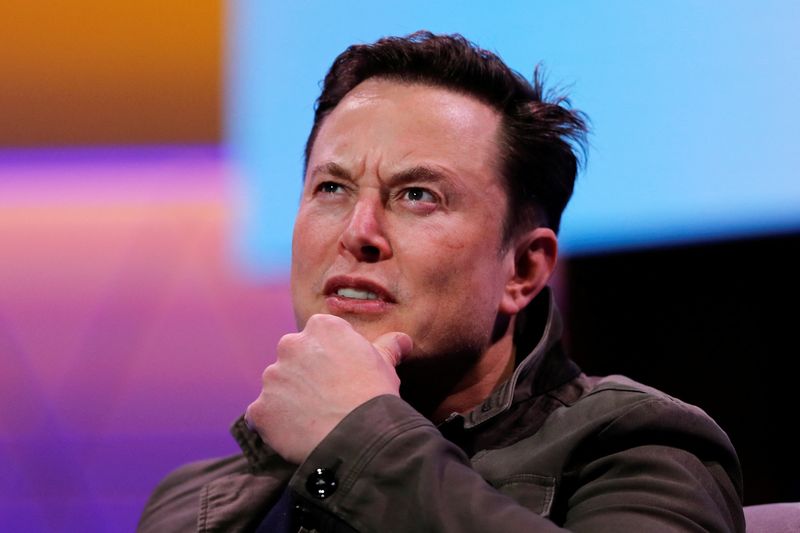
© Reuters. FILE PHOTO: SpaceX owner and Tesla CEO Elon Musk gestures during a conversation with legendary game designer Todd Howard (not pictured) at the E3 gaming convention in Los Angeles, California, U.S., June 13, 2019. REUTERS/Mike Blake
By Hyunjoo Jin and Chris Prentice
SAN FRANCISCO/NEW YORK (Reuters) -Did Elon Musk break U.S. securities laws again?
Former securities officials and professors said Tesla (NASDAQ:) Inc’s chief executive may have missed a key disclosure deadline and filed the wrong paperwork when he bought 9% of Twitter Inc (NYSE:), a platform regularly used by the outspoken billionaire. Securities and Exchange Commission regulators could use any shortfall to try to punish Musk more for other lapses, some believe.
Musk on Monday disclosed that he bought a 9.2% stake in Twitter, making him the micro-blogging site’s largest shareholder and triggering a rise of more than 27% in the company’s shares. The filing said that March 14, 2022, is the date of the event that required the disclosure.
U.S. securities law requires disclosure within 10 days of acquiring 5% of a company, and in Musk’s case the 10-day deadline was March 24. A late report could lead to a per-violation civil penalty of up to $207,183, according to Urska Velikonja, a law professor at Georgetown University Law Center.
That is a financial slap on the wrist for Musk, the world’s richest person with a net worth of $302 billion, according to Forbes, but the SEC could look into market manipulation allegations regarding the Twitter stock purchase and seek harsher sanctions in an ongoing investigation regarding his Tesla stock sales, experts say.
“This is not really a gray area. He acquired it and didn’t file within 10 days. It’s a violation. And so this is a slam-dunk case from the SEC perspective,” Adam C. Pritchard, a law professor at University of Michigan Law School, said.
In addition, Musk filed a “13G” disclosure form for investors who plan to hold their shares passively, even though it emerged on Tuesday that Musk will take a Twitter board seat in order to push change at the company.
That means he should have filed the “13D” form used by activist investors, officers and directors who have the ability to influence the management and policies of an issuer, said several lawyers.
Eleazer Klein, co-chair of the global Shareholder Activism Group at Schulte Roth & Zabel, said Musk’s use of the 13G form was not appropriate and that regulators could have reason to review the matter.
Musk on Tuesday amended his earlier filing and filed the 13D form to report a change in his status to an active investor.
The SEC is already investigating Musk’s Nov. 6, 2021, tweet asking his followers whether he should sell 10% of his Tesla stake.
Musk is also bound by a 2018 SEC settlement that requires him to obtain preapproval on some of his tweets, after he tweeted that he had “funding secured” to take Tesla private. The SEC said that he defrauded investors.
Musk says the SEC is harassing him in a bad-faith effort to punish him for criticizing the government, and he is fighting to nullify the deal.
Pritchard said the SEC could “tell a court that he’s a recidivist violator of the securities laws and that he needs to be dealt with harshly.”
SEC and Tesla did not respond to requests for comments.
Tesla shares closed down 4.7% on Tuesday.
“REAL RISKS”
Musk also made comments about Twitter after his purchase but before disclosing his stake.
On March 25, Musk tweeted a poll: “Free speech is essential to a functioning democracy. Do you believe Twitter rigorously adheres to this principle?”
A day later, Musk said he was giving “serious thought” to building a new social media platform.
“Musk is taking real risks here,” said Georgetown Law’s Velikonja. Musk was playing a game with the SEC officials, saying, “‘Stop me if you can, but you can’t,'” she said, adding, “I do suspect the SEC is going to look long and hard into whether they can bring manipulation charges, along with the failure to file.”
Musk has been critical of Twitter and its policies of late, accusing the company of failing to adhere to free-speech principles.
“Arguably, his social media posts about potential alternatives to Twitter can be seen, in light of his previously undisclosed stake, as a form of market manipulation to affect the share price, but proving that seems difficult,” said Howard Fischer, a former SEC counsel and a partner at law firm Moses & Singer.
“The fact that the revelation of his stake caused a price rise that resulted in Musk’s stake increasing in value is something that the SEC might look into.”
Twitter shares have surged since mid-March when Musk purchased his stake. The stake, valued at around $2.4 billion at the closing price of March 14, jumped to $3.7 billion as of Monday’s closing price.
In addition, some well-timed trades in Twitter options days before Musk revealed his purchase are raising eyebrows among options analysts.
The SEC would likely investigate if anyone who knew about the acquisition of the shares traded in advance of the filing, said Jacob Frenkel, a former SEC enforcement attorney and government investigations and securities enforcement practice chair for law firm Dickinson Wright.
“I really think that would be the focus rather than the tardiness,” Frenkel said.
Stay connected with us on social media platform for instant update click here to join our Twitter, & Facebook
We are now on Telegram. Click here to join our channel (@TechiUpdate) and stay updated with the latest Technology headlines.
For all the latest Business News Click Here
For the latest news and updates, follow us on Google News.
